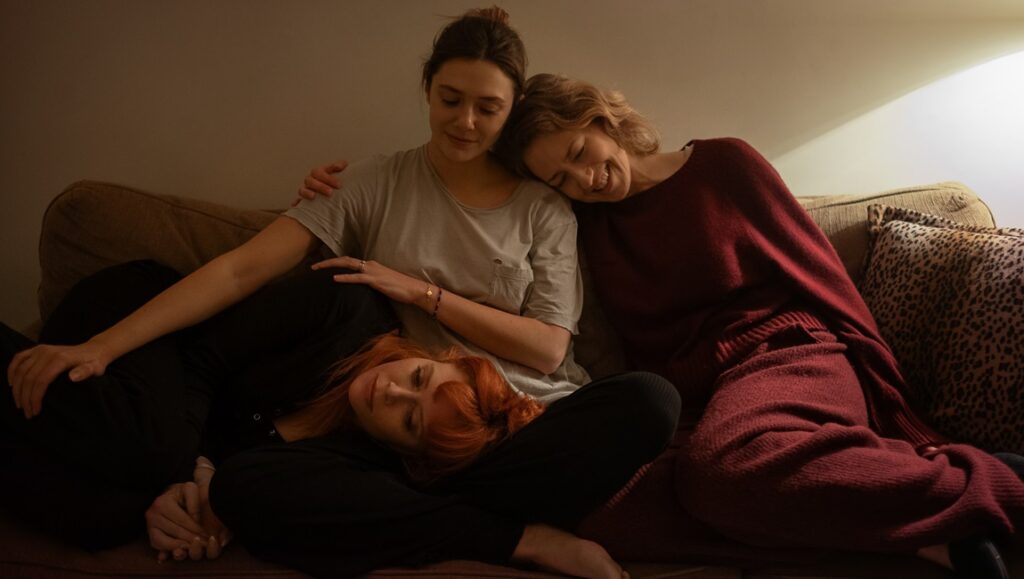At the end of the very first (of many) verbal arguments in Azazel Jacobs’ His Three Daughters, an emotionally potent chamber drama about three estranged sisters coming to terms with their fractured interpersonal relationships as they watch over their ailing father during his final days in a cramped New York apartment, we get a wide shot of our three characters, sat equidistantly away from each other across a dining table, in a triangular composition. It’s the thesis shot of the film: the image that pretty much tells us everything about who these characters are, what they think of each other, and how differently they’re trying to cope with grieving their father’s fast-approaching death. Katie (Carrie Coon), sitting upright with her hands firmly crossed together, commands the right side. Rachel (Natasha Lyonne), casually slumped over, with her hands burrowed inside the pockets of her oversized jumper, quietly occupies the left. And Christina (Elizabeth Olsen), calmly leaning forward but always, somewhat agitatedly, gesturing her warring sisters to cool down, is at the center, playing the film’s mediating force; she’s the emotional bridge that connects Katie’s brand of theatrical cruelty (reminiscent of the painful pitilessness of everyone involved in Ingmar Bergman’s Cries and Whispers) to Rachel’s brand of wound-up sadness (reminiscent of Casey Affleck’s beat-down performance in Kenneth Lonergan’s Manchester by the Sea).
Jacobs wants to strike the same balance in His Three Daughters — between capturing and embodying grief’s loud, almost abrasively violent expressions and its more imperceptibly quiet, conspicuously absent ones — to emphasize and empathize with the entire spectrum (or at least triangle) of grief. But his film is, by and large, better at sentimentality than subtlety. In other words, it’s most successful at foregrounding overexpression by either flaunting it through Coon’s perpetually highly strung performance (that takes some time to get used to) or, more significantly, by highlighting Rachel’s quietly withheld emotions. Lyonne’s performance is not at fault here: her marvelously raspy voice and inscrutable poker face (sorry, couldn’t resist!) are too naturally comedic to reveal the reservoir of emotion she’s hiding underneath them. It’s Jacobs’ filmmaking choices: his decisions, for instance, to give us a closeup shot of a tear rolling down Rachel’s cheek when he can communicate the same by studying Lyonne’s wound-up body language in a medium-wide, undermine the withheld nature of her emotionality. It’s a minor moment, sure, but it represents Jacobs’ sensibility — of establishing and insisting on absences but then revealing them too melodramatically — that almost reaches its breaking point in the film’s final act, wherein the sudden appearance of a character, whose presence had otherwise smartly been implied through his literal absence, pushes the film into Hollywood schmaltz territory.
The reason it never entirely breaks, then, is because His Three Daughters has Christina — and, more importantly, Olsen’s magnificently multifaceted performance — consistently nudging it toward striking that balance between the theatrical and the authentic. Right from the beginning, when she’s playing mediator to her two sisters, there’s a slightly disconcerting edge to her performative pleasantness. She appears natural when greeting her father’s hospice caretakers, who regularly come into the house and incite outright derision from Katie and sarcastic mocking from Rachel, without ever exactly feeling that way: the strain of having to play the role of the pleasant one manifests in a way that’s discomforting, yes, but also amusing. The same happens when she’s seething with anger. We get one impromptu burst of emotion from her that feels violently real (it’s most certainly going to be the showreel clip for Olsen’s upcoming awards campaign), but then an almost comical, but crucially not phony, cooling down phase where she does extensive breathing exercises to gain her sense of control back. Her anchoring performance is always entertaining and enthrallingly enigmatic: we’re never sure if Christina will burst into tears, or do that but then promptly undermine it with a throwaway joke, or simply continue to cover it all up by wearing her mask of curiosity and kindness. It is, like the most moving depictions of grief in cinema itself, fundamentally and thrillingly unclassifiable.
DIRECTOR: Azazel Jacobs; CAST: Natasha Lyonne, Elizabeth Olsen, Carrie Coon, Jovan Adepo; DISTRIBUTOR: Netflix; IN THEATERS: September 6; STREAMING: September 20; RUNTIME: 1 hr. 41 min.


Comments are closed.